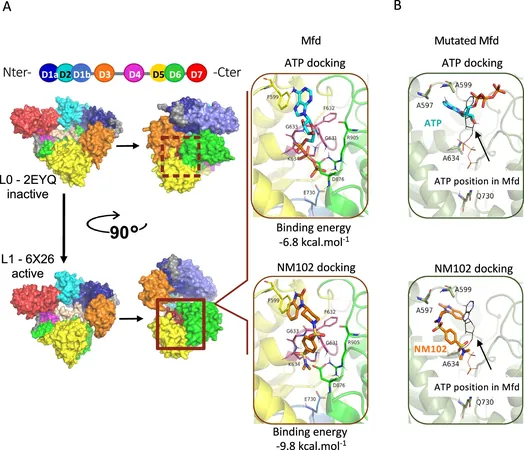
Revolutionary Molecule Disarms Harmful Bacteria Without Harming Good Ones!
2025-04-28
Author: Siti
A Game-Changer in the Fight Against Antibiotic Resistance
In a groundbreaking study, a dynamic team of researchers led by INRAE, which also includes experts from CNRS, Université Paris-Saclay, and Inserm, has discovered an astonishing molecule that can effectively "disarm" harmful bacteria. This innovative approach holds promise for tackling the escalating crisis of antibiotic resistance without jeopardizing the beneficial bacteria that are crucial to our health.
Patented Breakthrough Published in Nature Communications
The team's findings, already secured with patents, have been published in the esteemed journal Nature Communications, paving the way for the development of new, more targeted treatments.
The Alarming Rise of Antibiotic Resistance
Antibiotic resistance represents a looming peril for global health—claiming approximately 5 million lives each year, according to the World Health Organization. This could tragically shift to become the leading cause of death by 2050 if left unchecked.
The Dark Side of Antibiotics: Resistance Development
While antibiotics have significantly lowered the mortality rate from infectious diseases, their overuse has led to a dire consequence: the emergence of resistant bacteria. Traditional antibiotics target broad cellular processes, affecting not just harmful pathogens but also the essential microbes of our microbiota.
Discovering the Key Player: Mfd Protein
The INRAE team pinpointed a crucial target—the mutation frequency decline (Mfd) protein, a factor that all bacteria utilize to withstand the host's immune response. Furthermore, this protein encourages random mutations, enhancing the bacteria's ability to develop resistance.
Disarming Pathogens Without Collateral Damage
Following this pivotal discovery, the consortium set out to create a molecule capable of blocking the Mfd protein and thus disarming harmful bacteria. After screening a staggering 5 million compounds, they isolated NM102, a promising molecule that effectively binds to the Mfd protein, inhibiting its function.
Remarkable Findings from Tests
Subsequent tests in both in vitro and in vivo models—ranging from insects to mice—unveiled three significant outcomes:
1. NM102 does not kill bacteria in the absence of immune toxins.
2. It significantly decreases pathogenic bacteria in infected organs while preserving the beneficial microbiota.
3. It effectively blocks the Mfd function, hampering the bacteria's ability to evolve resistance.
Effective Against Resistant Strains!
One of the most promising aspects of NM102 is its potency against bacterial strains known to resist current treatments, particularly those commonly found in hospital patients.
From Discovery to Drug Development
With two patents already issued covering both the bacterial target and the molecule itself, scientists are now escalating their efforts. They are encapsulating NM102 in biodegradable nanoparticles for enhanced administration and collaborating with CEA to chemically optimize this groundbreaking molecule, steering us closer to new drugs that could revolutionize our approach to combating antibiotic resistance.
 Brasil (PT)
Brasil (PT)
 Canada (EN)
Canada (EN)
 Chile (ES)
Chile (ES)
 Česko (CS)
Česko (CS)
 대한민국 (KO)
대한민국 (KO)
 España (ES)
España (ES)
 France (FR)
France (FR)
 Hong Kong (EN)
Hong Kong (EN)
 Italia (IT)
Italia (IT)
 日本 (JA)
日本 (JA)
 Magyarország (HU)
Magyarország (HU)
 Norge (NO)
Norge (NO)
 Polska (PL)
Polska (PL)
 Schweiz (DE)
Schweiz (DE)
 Singapore (EN)
Singapore (EN)
 Sverige (SV)
Sverige (SV)
 Suomi (FI)
Suomi (FI)
 Türkiye (TR)
Türkiye (TR)
 الإمارات العربية المتحدة (AR)
الإمارات العربية المتحدة (AR)